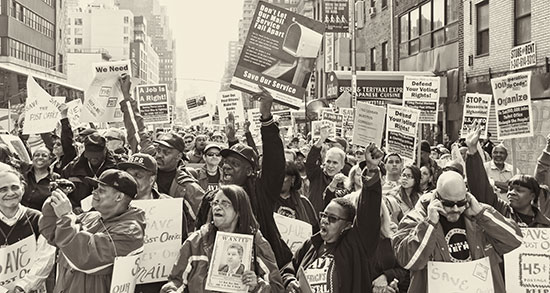Operation Zip Code:
Postal Service is not for sale!
By
Joseph Piette
New York
Published Mar 25, 2012 10:24 PM
“We need jobs! We need mail! The Postal Service is not for sale!” chanted hundreds of postal workers and community activists as they marched from Union Square to New York City’s historic main post office on March 17.
Organized by Community-Labor United to Save Postal Jobs and Services, mail carriers, clerks, drivers and mail handlers came from Baltimore to Bangor, Maine, and even from Canada to join with New Yorkers in demonstrating their opposition to the threatened privatization of the U.S. Postal Service.
Community members from the Chelsea Coalition on Housing, Picture the Homeless, the National Action Network Youth Movement, the South Bronx Community Congress and La Peña del Bronx joined postal workers in opposing the closing of their neighborhood post offices and the negative effects this will have on their communities.
The crowd stopped midway along their 20-block march route to say “Hell, no!” to the closing of the Old Chelsea Station on West 18th Street.
Clarice Torrence, president of the New York Metro Area American Postal Workers Union, and Charlie Heege, president of New York Branch 36 of the National Association of Letter Carriers, later addressed the crowd in front of the James A. Farley Post Office, where a historic postal strike had begun exactly 42 years earlier.
Postal workers from Maine, Maryland and Pennsylvania spoke, as did Mike Palecek, representing the Canadian Union of Postal Workers. Chris Silvera of Teamsters Local 808, Eddie Yood of Communications Workers Local 1180 and Charles Jenkins of Transport Workers Local 100 also expressed their solidarity.
Postal managers, Congress behind cutbacks
More than 200,000 postal positions have been eliminated since 1999. Now another 200,000 jobs, 3,700 post offices and 223 mail processing plants are on the chopping block if Postmaster General Patrick Donahoe has his way.
The new cuts are different from those in the past. Until now, mail delivery mandates have not been affected. These new cutbacks, however, would eviscerate mail delivery standards, increasing the length of time required to deliver first class mail from overnight to two or three days within most urban areas and longer in rural areas and over long distances.
In effect, these cutbacks would be a giant step to privatization, providing a rationale for private competitors to take over valuable postal business with the promise that they would “provide better mail service.”
The drastic measures being taken by postal management are being driven by a 2006 law that forces the U.S.P.S. to pay $5.5 billion per year for retiree health care benefits — 75 years in advance! It’s a burden that no other private business or government agency is required to pay.
Heege pointed out at the rally that “in the first quarter of their fiscal year, 2012, they had a $200 million profit. That profit came from ordering purchases online, which increased 7 percent from last year.”
President Fredric V. Rolando of the National Association of Letter Carriers has said that without the unnecessary burden of the mandated advance payments toward retiree benefits, “the Postal Service would be profitable most years, and in fact would have netted a $4.6 billion profit from 2006 to 2009.” (usatoday.com, Nov. 12, 2010)
Operation Zip Code members plan more activities on March 31 and April 6, as well as participation in the New York May Day march.
Articles copyright 1995-2012 Workers World.
Verbatim copying and distribution of this entire article is permitted in any medium without royalty provided this notice is preserved.
Workers World, 55 W. 17 St., NY, NY 10011
Email:
[email protected]
Subscribe
[email protected]
Support independent news
DONATE


